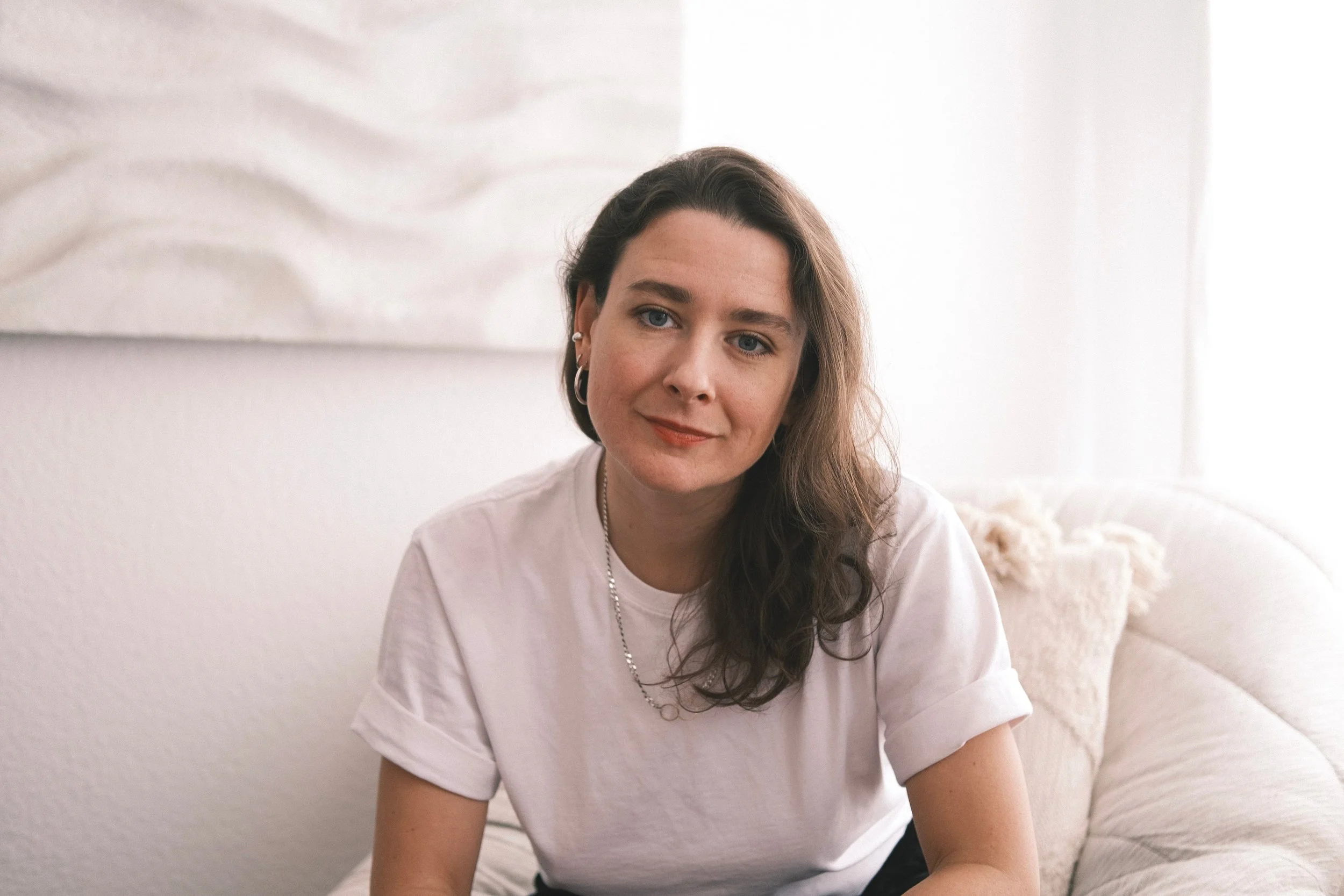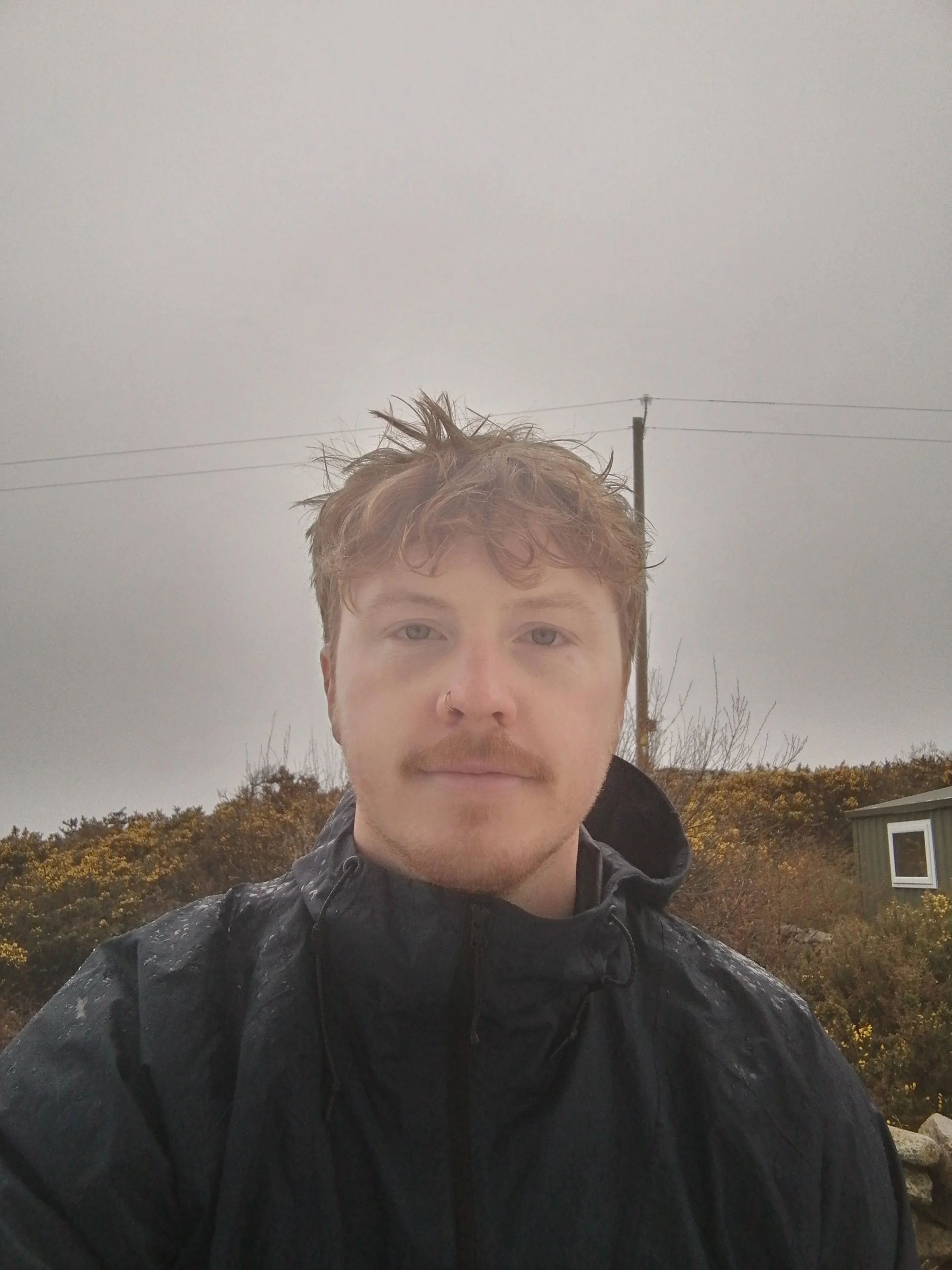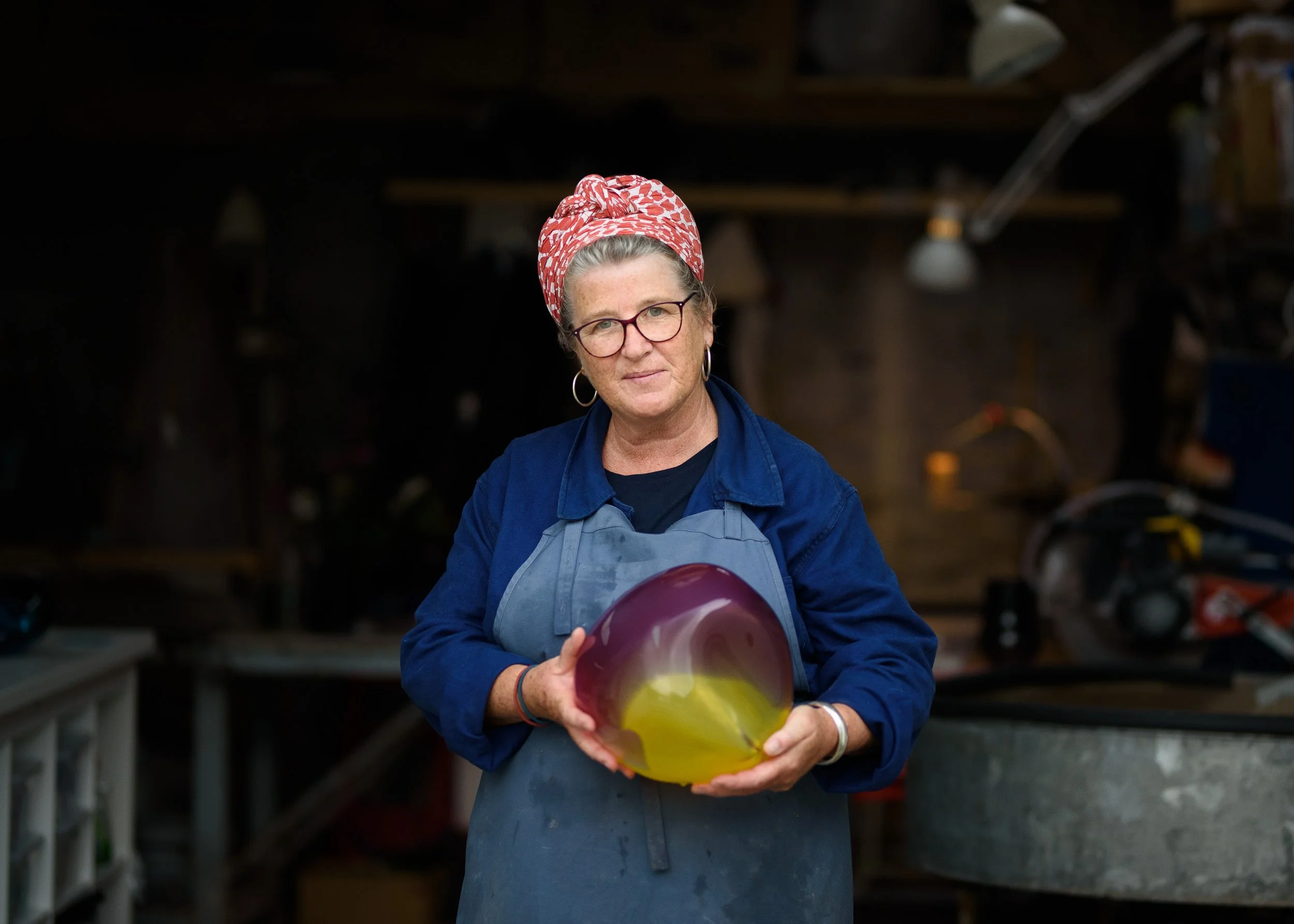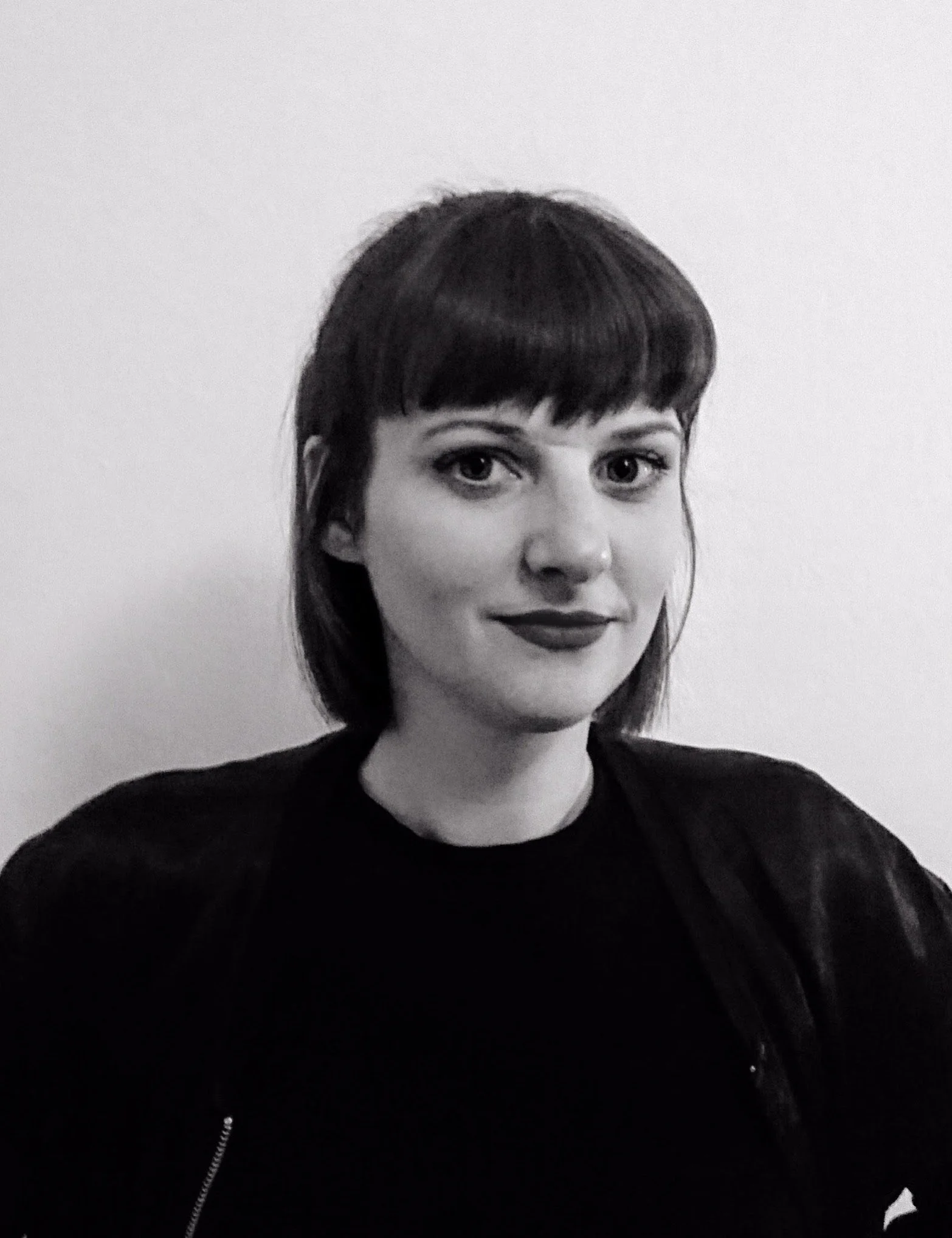
Meet the bursary awardees working with upland communities.
Collaboration, listening, and creativity are essential to face the challenges of biodiversity loss, climate change, and the socioeconomic realities of Ireland’s uplands. Therefore, the Dinnseanchas project is bringing together a group of artists who will work closely within their focus community. These artists and communities will be supported by mentors from the fields of ecology, arts, community engagement, and anthropology.

Dinnseanchas Community Artists
Zoë Rush
As an interdisciplinary artist dedicated to community-led resilience, Zoë’s practice merges creative expression, environmental immersion, and research methods from the social sciences. Through practices like soundwalks, visual scribing, and co-creation workshops, she facilitates experiences that invite participants to explore their relationship with place and envision sustainable futures.
Her artistic focus is the transformative potential of augmented reality, specifically the use of soundwalks, to inspire new ways of thinking and interacting with the natural world. These soundwalks usually consist of an audio file which a listener plays while walking through a specific space, before gathering with others to reflect on what the experience evoked. I am deeply inspired by Johanna Steindorf’s blurring of performative art with social research, as well as Janet Cardiff’s responses to place and heritage through this medium.
Zoë has previously designed soundwalks and creative participatory workshops for festivals such as Goethe-Institut Mexiko’s Nachhaltig Leben! Hacia un future Sostenible and KISD’s Attending to Futures conference in Germany. More recently, she supported the Killarney Cup Project to design immersive experiences for over 600 students in the area to support younger generations to explore their natural heritage and develop climate actions that are relevant to their lives.
William Bock
William Bock produces innovative socially focused projects for and about diverse communities and the environments they inhabit. Born in Cork with a diverse cultural family background, the artist's work explores the connections between identity, heritage, ecology and migration. In 2023 his work was presented at The Irish Museum of Modern Art (IMMA), Visual Carlow, Cavan Town Hall, Uillinn West Cork Arts Centre and featured on RTE One’s Culture Night Special. The artist is consistently funded by Arts Council Ireland and in 2022 he received an Arts Participation Bursary Award for Land Art Meitheal. Between 2021- 2022 he created his debut film project RISING, collaborating with community members along the Shannon estuary, commissioned by Ormston House in Limerick. In 2020 he produced Land Walks Land Talks Land Marks, a multidisciplinary exhibition at Uillinn West Cork Arts Centre in collaboration with asylum seekers funded by West Cork Development Partnership and Create: the national development agency for collaborative arts. Bock presents his projects internationally, with upcoming projects with ArtHouse, Jersey Island and the Harvest Festival, Morocco. The artist is a member of the Wilderness Art Collective and a founding member of award winning artist group Dig Collective.
Síomha Brock
Independent musician Síomha (pronounced She-vah) dances the line between folk, jazz and neo-soul effortlessly taking audiences on an unexpected and unforgettable journey with her soulful melodies. Her debut album ‘Infinite Space’, described by The Irish Times as “a seriously accomplished and self-confident debut”, is a collection of songs in both Irish and English. A kind of cosmic, folk-informed, jazz-tinged, post-pop - it was produced by Grammy-nominated Tyler Duncan and features an all-star lineup of US and Irish musicians.
Síomha is an artist at the forefront of the recent cultural revival of the Irish language, using the language in a context that hasn’t been seen before. Her work also extends beyond music into activism and she carries this into her arts practice, offering free mentorships, creating recycled and second-hand merchandise, and engaging regularly with and fundraising for various charities and social justice organisations.
Síomha’s voice is full of heart and her music defies conventional genres. The influences of her musical background, her travels and her musical explorations are audible in the music she creates. The beautiful landscape and rugged nature of her native West of Ireland are a huge source of inspiration for this proud Co. Clare artist leading her to create a soulful and unique style of music that enthrals anyone who hears it.
Peadar-Tom Mercier
Peadar-Tom is a traditional musician, tutor and event producer from An Cheathrú Rua, Galway. His work consists of teaching traditional music through the medium of Irish in multiple schools around the Gaeltacht, organizing arts events with the group Gliogar and being the bandleader/composer for Trá Pháidín. His professional work is focussed on a long-term development of the cultural landscape through the Irish language in the Gaeltacht, be it through
widespread education of the traditional arts in younger generations or organizing events which facilitate the nurturing of a community of artists and/or patrons, essentially to be a fruitful stepping stone for the wider ecosystem. His areas of interest are psychogeography, community development, folklore, education and the informal.
Róisín de Buitléar
Róisín is a visual artist, educator and curator. She has worked with glass since 1982, drawing inspiration from her cultural heritage. She has site-specific installations in public buildings throughout Ireland. Her
artworks are represented public collections in Ireland, Britain, Japan, France, China, and the USA. She often works in collaboration with communities and marginalised people to create projects that bring awareness to social and cultural issues. She has worked in sound, light projection and performance in glass creating ephemeral site-specific projects that are intentionally not recorded or populated on social media. Her recent work concentrates on climate action and building awareness around social responsibility for civic action. Working with a Venice based glass factory she has been remaking objects from their glass waste with minimum use of fossil fuels. CAUTION! Fragile Tradition in Transition a seminal exhibition focussing on traditions of cutting and engraving glass was shown at the National Museum of Ireland, where she was the inaugural Artists in residence for 2018. She won the Bonhams Special mention at Venice Glass Week 2019, has recently been selected for the Royal Hibernian Academy exhibition and The Ireland Glass Biennale.
Patrick Mulvihill
Patrick Mulvihill (he/him) is a socially engaged artist embedded in the community of Athenry through the social enterprise, Amicitia, which he co-founded in 2015. This organisation nurtures place-based economic, social, and cultural strategies to promote a just transition. These projects include a community cafe, sustainable energy community and adult education programs.
With a foundation in sound engineering and systems design, Patrick weaves together these disciplines within community-engaged projects to create immersive, multisensory experiences that resonate deeply with participants. His work aims to not only amplify the voice of the community but also transform spaces into interactive platforms for storytelling, environmental awareness, and cultural exchange. This blend of art and activism demonstrates his commitment to building socio-economic systems rooted in equity, care, and responsibility.
Patrick holds an MSc (Hons) in Cooperative and Social Enterprise from UCC, with his dissertation on facilitating a 'Just Transition in Rural Communities'. His ongoing journey is one of active listening, learning, and collaboration with a diverse network of stakeholders, to inform and enrich his practice.
Heather Griffin
Heather Griffin traverses the boundaries of art, design and futures, creating new narratives for our transitional times. Within this space she presents alternative visions of the world through speculation, world building, play, and experiential learning. A practice grounded in analysing and utilising mythologies, social phenomena, and the rhythms of everyday life, thereby critiquing the contradictions of our contemporary capitalist realities. She adopts a pluralistic, iterative approach and prioritises interdisciplinary collaborations to engage communities, conduct deep research, and embrace complex systems. Her work consists of multimedia outputs, shaped by the contextual nuances of place, which provoke discourse and aspire to collectively imagine alternative futures that contribute to the shaping of more equitable and regenerative worlds.
Heather has written, designed, built, recorded and performed a number of live and immersive experiences and installations both nationally and internationally. Her project, A Giant Leap, with Amicitia and Science Gallery Dublin was described as ‘one of their most impactful projects in recent years’ sparking the imagination of their global audience. She has given guest lectures on Transition Design and Futures at TU Dublin, IADT and University of Greenwich.
Dinnseanchas Consultants and Artists in Residence
Grace Wells
Grace Wells is participating in the Dinnseanchas project as writer-in-residence. Grace is an award-winning eco-poet and environmental writer, who also creates eco-poetry film. Nature, spirit-of-place and environmental concern have been the main themes of her writing ever since the publication of her first book, the children’s novel ‘Gyrfalcon’, which won the Eilís Dillon Award and was an International White Ravens Choice. Wells has published three books of poetry with Dedalus Press, most recently in 2022, ’The Church of the Love of the World’. Grace has volunteered with Hometree for many years, and also supported the charity with a number of writing projects, including ‘Under Summer Pastures’, a collection of essays written by some of Ireland’s leading ecological thinkers exploring Ireland’s endangered Temperate Rainforests.
Within Dinnseanchas, Grace will write about the role of language in the ecological crisis, specifically the limits of the English language, and the possibilities that Gaelic offers. Her exploration will gyre around the language we use to speak of our ecological challenges, and the ways we feel free or restricted in speaking of our love for the earth, or how we hold nature as sacred. Her work reflects on the impacts of eco-shame on our capacity to reach our deepest Earth-centred values and increase the speed of behavioural change. She has worked in eco-arts for more than twenty years and understands the challenges artists can face, and the benefits of additional support with community projects.
Jennifer Ahern
Jennifer Ahern is an artist and environmental anthropologist, based in the Environmental Research Institute in UCC, Cork. Her areas of interest and expertise are
Community-based participatory engaged research
Systems change and regenerative thinking
Relational placemaking
The role of story, narrative, and framing in relation to transformative change
Climate Justice
Worldviews and human-nature relationships
Using an engaged methodology, Jennifer is currently conducting a PhD research study that is examining the nature of transformative change in communities addressing sustainability challenges, in both rural and urban contexts. As part of this work she is collaborating with Hometree on Dinnseanchas and will be working alongside artists throughout the project. As part of this role, she will be gathering data on behalf of Hometree that will also contribute to a wider study on transformational change. This will be done mainly through interviews with selected community participants, surveys and monitoring attendance at workshops and events. Given the socially engaged aspect of Dinnseanchas, Jennifer’s role in the workshops will be as a co-facilitator, not a passive observer.
Dr David Teevan
David Teevan has worked for over thirty years as a creative producer, festival maker, researcher and consultant. His roles have included General Manager of Galloglass Theatre Company (1991-2001), Artistic Director and CEO of Clonmel Junction Festival (2001-2015) and Festival Advisor for the Arts Council of Ireland/An Chomhairle Ealaíon (2016-2022). Since 2022, David has been working freelance as an arts consultant, supporting festivals and community engaged art organisations to develop strategic plans and build operational sustainability. Current projects include managing the Naturally Wild Festival consortium’s development of a fit-for-purpose Carbon Calculator suitable for a multi-venue urban festival, and assisting a number of Kerry festivals develop EDI policies and deliver new programmatic features that broaden their public engagement to reach and represent the diversity of the communities living in their area.
In 2020, David was awarded a PhD from the School of Art History and Cultural Policy at UCD for his study of the challenges artists face when co-creating and co-authoring art with communities of place or interest. He is a co-founder of the Irish Arts Festival Archive, which is housed in the UCD Library as part of the Cultural Heritage Collection. Over the last number of years, David has been a regular lecturer on Arts Management Masters courses at University of Galway, University of Limerick, University College Dublin and Hochschule Heilbronn.










